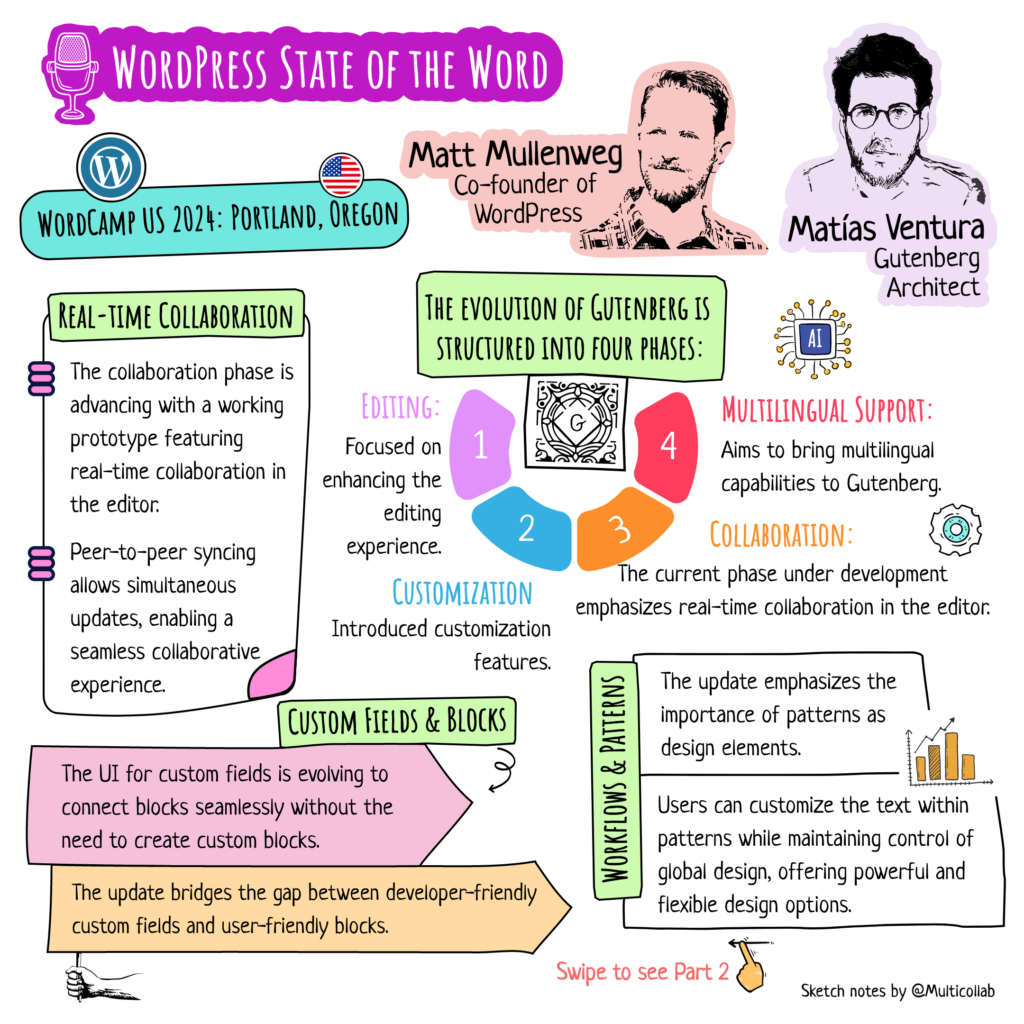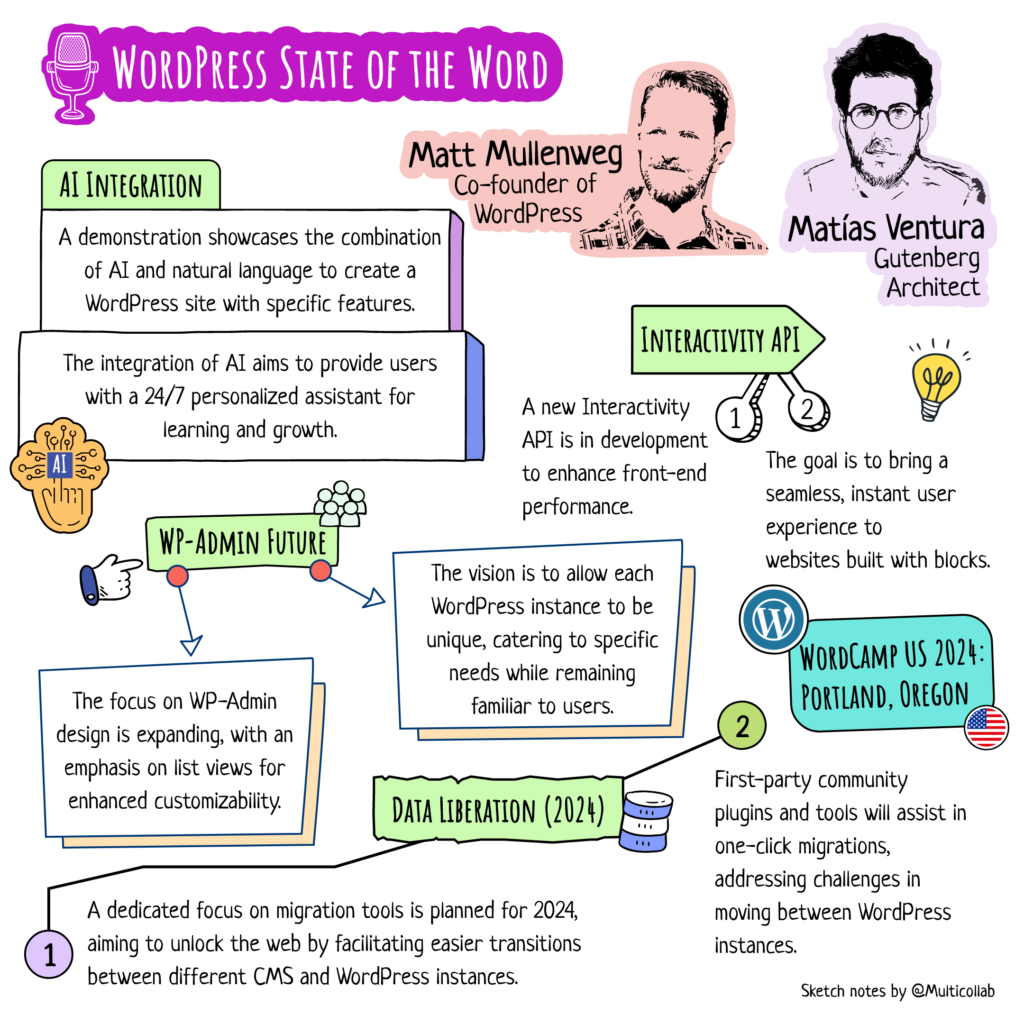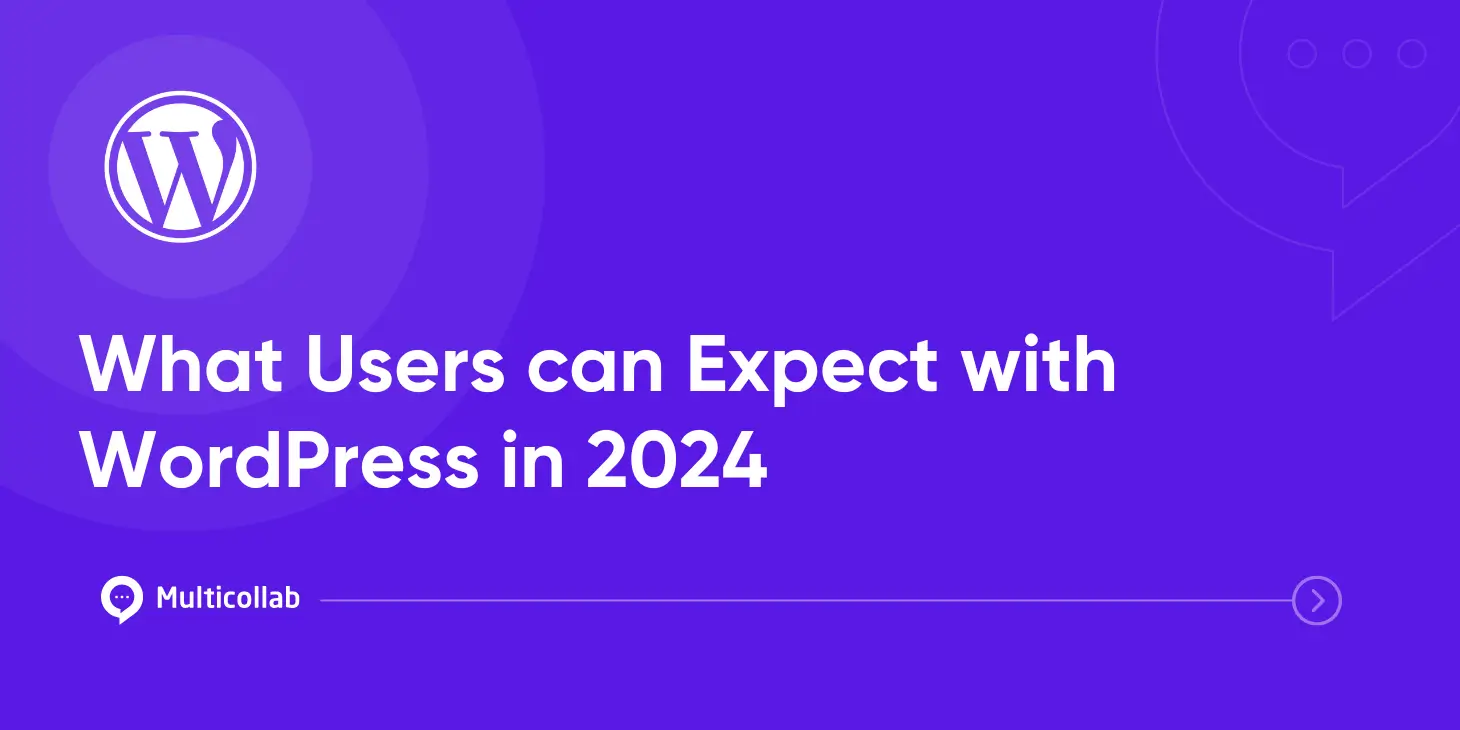Table of Contents
WordPress is poised for an exciting journey in 2024, with significant developments and enhancements on the horizon.
With three major releases scheduled throughout the year, along with a focus on key development areas, let’s delve into what’s in store for WordPress enthusiasts and users.
Three Major Releases
Slated for release in 2024, each of these releases brings a suite of enhancements and features to empower users and developers by extending existing features, alike.
WordPress 6.5: Expect faster loading times, built-in translations, and refinement of existing functionality.
WordPress 6.6: This stabilization and polish release will focus on optimization, reliability, and continued security enhancements.
WordPress 6.7: Anticipate enhanced collaboration tools and potential inclusion of features from the previous releases.
Roadmap to WordPress 6.5
WordPress 6.5 was set to be released on March 26th, 2024. However, its release will be delayed one week and is now scheduled for release on Tuesday, April 2nd, 2024. This release brings:
- Greater design control and optionality,
- more robust block capabilities with new APIs,
- access to current block theme functionality for classic themes, and
- the start of the new admin redesign.
More specifically, these significant features include:
- The Font Library for easy global font management,
- support for Appearance Tools in Classic Themes for more expansive design options, and
- more robust revisions across the editing experience (including revisions for template parts and templates).
- New APIs like Interactivity, Custom Fields, and Block Binding expand block capabilities and
- underpin features like partial sync patterns, and
- PHP compatibility work ensures alignment with PHP versions.
- Rollback for plugin and theme updates enhances safety, and
- bug fixes address various components for an improved user experience.
You can check out the official page for WordPress 6.5 Development.
The initial phase of admin redesign, part of phase 3 efforts, is slated for release in WordPress 6.5. It aims to revamp the user experience in the Site Editor by enhancing the template, template part, and pattern lists. However, these features are still under active development and may not all be included in the final release.
If you want to have a more detailed look at the work related to the block editor, please refer to the 6.5 board.
| Release | WordPress 6.5 (April 2) | WordPress 6.6 (July 16) | WordPress 6.7 (November 5) |
| Highlights | Suite of enhancements for users and developers | Stabilization and polish release | A suite of enhancements for users and developers |
| Faster loading times, built-in translations | Refinement of existing functionality, bug fixes | Further refinements in block editor, code optimization | |
| Expanded customization abilities | Focus on optimization and reliability | Continued security enhancements, REST API improvements | |
| Enhanced collaboration tools | Potential inclusion of collaboration tools from 6.5 | ||
| Expectations | More typography options, color scheme adjustments | Improved stability and consistency | Streamlining workflow, code optimization |
| Possible data views for blocks, robust revision history | Maintenance focus, potential minor feature enhancements | Enhanced authentication mechanisms, REST API improvements |
Focus Development Areas in 2024
WordPress development in 2024 will prioritize several key areas to meet the evolving needs of users in the following areas:
Gutenberg Phase 3: Collaborative editing, multiplayer, and co-editing remain core focus items, with a prototype already available for review. Community members are encouraged to engage with the prototype and provide feedback.
Voice Search Optimization: With the rise of voice search technology, WordPress aims to optimize websites for voice-based queries, improving accessibility and user experience.
Multilingual Plugins: WordPress will focus on enhancing multilingual support, enabling users to create websites in multiple languages effortlessly.
Dark Mode: Introducing dark mode functionality provides users with an alternative interface option, reducing eye strain and enhancing usability.
Better Security with Blockchains: Implementing blockchain technology enhances security measures, providing decentralized and tamper-resistant protection for WordPress websites.
Headless WordPress Implementation: Decoupling the front-end and back-end of WordPress allows for greater flexibility, enabling developers to create more dynamic and interactive websites.
AI Integration for Enhanced User Experience: Integrating artificial intelligence with WordPress improves content recommendations, personalization, and overall user experience. Also, maintain a stronghold in e-commerce with ongoing AI-driven enhancements.
Sustainability Initiatives: WordPress prioritizes sustainability by implementing eco-friendly practices and encouraging environmentally conscious website development.
Minimalist Themes: Streamlined design for modern aesthetics and optimal performance.
Drag & Drop Page Builders: Democratizing website creation with intuitive tools and customization options.
WordPress Development: Additional Focus Areas
In a very recent WordPress podcast, Josepha Haden Chomphosy discussed what else is under focus for development.
Plugins: Plugins have undergone significant improvements and are pivotal in enhancing the WordPress ecosystem. Continued momentum is crucial to sustain these advancements and ensure their seamless integration with WordPress functionalities.
Old Tickets: Resolving long-standing issues represented by old tickets is imperative to enhance user experience and maintain the platform’s reliability. Addressing these issues demonstrates a commitment to the community’s needs and fosters trust among users.
New Meetups: Emphasizing the importance of new meetups encourages community engagement and facilitates knowledge sharing among WordPress enthusiasts.
Data Liberation: A project introduced at State of the Word, emphasizing the importance of data portability and ensuring that content isn’t lost in case of issues. Will involve improvements to importers and exporters.
Given that 2024 will hold a bulk of the work for Phase 3, she expects that 6.5 and 6.7 will be focused on those Collaborative features. She proposes that 6.6 be held specifically for maintenance and general polish of the software.
Real-Time Collaboration
Real-time collaboration in WordPress Phase 3 aims to enable users to work together on content and websites, including editing documents concurrently and leaving comments. Currently, users can only work on posts and pages sequentially, with the ability to take over or leave if the content is being edited. This feature, similar to Google Docs, Canva, or Sketch, enhances WordPress competitiveness.
By providing the infrastructure and user interface that supercharges multiple users to work together on the same content simultaneously, Gutenberg Phase 3 should simplify the process of the team-based web page and post creation, editing, and customization.
The collective sentiment of medium and large-sized WordPress organizations expects collaborative features in the following manner:
- Multiple people editing a doc at once.
- Role-specific permissions allowing some folks to accept/deny various edits.
- More granular ability to edit specific parts of a post/page at once without having full access to everything, including block leveling locking.
- Commenting functionality, including the ability to @ folks.
- Public preview link for folks, regardless of whether they have access to the site.
Gutenberg Phase 3 promises to bring real-time collaboration to WordPress, making it a game-changer for content creators and teams. By adding more functionalities to the editor, Gutenberg Phase 3 will keep content teams and their need to produce quality content faster at its core, piggybacking on the below-mentioned broader objectives of Phase 3.
- Editing: To provide a seamless post and page editing experience
- Customisation: To allow teams to push their creative limits while representing their brand
- Collaboration: To facilitate peer-to-peer communication during content development
- Multilingual: To reduce technological barriers for creators across the world
Currently, Multicollab is one such WordPress plugin that offers real-time collaboration capabilities right within the Gutenberg editor.
Additionally, Phase 3 introduces collaboration tools like publishing workflows, allowing defining requirements and tagging users for tasks. Post revisions will become more detailed, with granular block revisions. The media library will undergo an overhaul, including tagging and filtering mechanisms, along with editing tools. A search and command prompt feature is also planned, though not prioritized currently.
Long-Term Roadmap
In recent years, the WordPress project has revolutionized content creation and management on websites through the introduction of blocks, offering users enhanced flexibility and creativity. The Gutenberg project, spanning multiple phases, initially introduced the block editor in WordPress 5.0, followed by extending the block editing experience across the entire site. Further enhancements like patterns and block themes streamlined design processes and encouraged full-site block integration. The collaborative efforts of the community have contributed to a growing library of resources, empowering users to craft impressive websites. Looking ahead, the project’s third phase aims to prioritize seamless collaboration, refining user experiences, and optimizing content management workflows for enhanced teamwork within WordPress.
As a reminder, these are the four phases outlined in the Gutenberg project:
- Easier Editing — Already available in WordPress, with ongoing improvements
- Customization — Site Editing, block patterns, block directory, block themes
- Collaboration — A more intuitive way to co-author content
- Multilingual — Core implementation for Multilingual sites
Check out these Sketches to know more about what Matt Mullenweg had to say about WordPress in his WordPress State of Word panel talk.


Conclusion
The WordPress roadmap for 2024 promises significant advancements, marking some of the largest changes since the introduction of the block editor. The upcoming major releases aim to make WordPress more powerful, customizable, and modern. While not all changes will occur in 2024, the year will set the groundwork for future developments.
Check out this video where WordPress Co-founder Matt Mullenweg speaks at WordCamp Asia 2024, taking questions from the audience.
Note: Apart from WordPress’ numerous WordCamp gatherings, you can choose to attend these WordPress conferences catering to developers, designers, marketers, or any individual eager for knowledge and growth.







